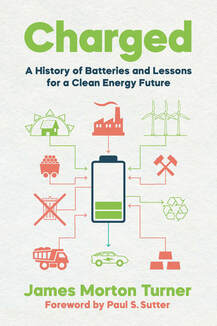 Can batteries power a clean-energy future? Learn more about the past, present, and future of batteries, the environment, and questions of sustainability in Jay Turner's new book, Charged: A History of Batteries and Lessons for a Clean Energy Future at this website: www.charged-the-book.com. The book will be available in August 2022.
Jay Turner and Drew Isenberg spoke with Rachel Waldholz about how climate change went from being an environmental issue to another front in the culture wars for How to Save a Planet's episode on "Making Republicans Environmentalists Again".
New Yorker staff writer Elizabeth Kolbert featured The Republican Reversal in a column on Earth Day, April 22, 2020.
On January 16, 2019, as a part of Wellesley College's annual Albright Institute, Jay Turner moderated a conversation about environmental politics with John Podesta (founder Center for American Progress, Chief of Staff during the Clinton administration, and former chairman of Hilary for America) and William Reilly (former EPA administrator during George H. W. Bush's administration). Click the image below to replay the session.
Why a Small Change in the Mercury Regulation has Big Implications for the Future of Public Health1/4/2019
Op-ed by James Morton Turner and Andrew C. Isenberg
A week ago, the Trump administration proposed a radical change in environmental regulations that could undermine future efforts to curb air pollution. Despite its far-reaching implications, the proposal has drawn little attention amid the urgencies of the government shutdown and the new Congress. Three alarming things stand out about the announcement: its timing, its justification, and its place as part of a larger rollback of environmental protections. The first cause for alarm is the timing of the announcement: it was released on the Friday between Christmas and the New Year. Trump’s EPA chose to announce the proposed rule change when many journalists and editors would be on vacation and when much of the public has tuned out the news for the holidays. It is hard to imagine timing better calculated to escape public and media scrutiny. The Trump administration has good reason to want to avoid such attention. Environmental protection laws have remained broadly popular since they were first enacted in the early 1970s. Since the mid-1980s, the Gallup organization has asked Americans whether environmental protection or economic growth should be prioritized. At only one point—the four years following the 2008 economic collapse—did a majority prioritize the economy. In 2018, 57 percent of Americans agreed that protection of the environment should be a priority, even at the cost of curbing economic growth. The second cause for alarm is the Trump administration’s justification for the rule change. Like many environmental laws, the rules regulating mercury emissions are in essence public health laws. The Obama administration, which put the current rules in place in 2011, justified the cost to utility companies of roughly $7 to $10 billion per year by pointing to the health benefits to Americans. Although the Obama rule targeted mercury emissions, which is a potent neurotoxin that disproportionately affects children, reducing mercury emissions also reduces emissions of particulate matter. The Obama administration estimated that such emissions caused 4,700 heart attacks, 130,000 asthma attacks, and 11,000 premature deaths every year. Putting a price on co-benefits is complicated, but the Obama administration estimated that those and other benefits amounted to $80 billion a year. What is so troubling is that the Trump administration’s proposed rule does not change the emissions limits for mercury. Instead, it eliminates the EPA’s ability to factor co-benefits, such as the health benefits from reduced particulate matter emissions, in its cost-benefit analyses no matter how significant they are. This is just one more example of conservatives’ efforts to highlight the costs of environmental regulations, while downplaying their benefits. Consider the Acid Rain Program, which George H.W. Bush signed into law in 1990. By 2010, the program’s annual cost was $3 billion, less than half of what critics had projected 20 years earlier. The program prevented 18,000 premature deaths annually by 2010, a benefit economists estimate to be worth $108 billion annually. And electricity costs, which critics predicted would skyrocket as a result of the regulations? They fell for consumers in most states between 1990 and 2009. Finally, the proposal to roll back the mercury emission regulations is part of a pattern of conservative Republican environmental deregulation. The Trump administration has rolled back scores of environmental protections. His administration has loosened regulations restricting industrial pollution, opened up new federal lands to fossil fuel exploration, made unprecedented reductions to national monuments, and initiated the process to withdraw the U.S. from the Paris climate agreement. The Trump administration has further proposed to significantly reduce the scope of the Clean Water Act, reduce vehicle fuel-efficiency standards, and roll back Obama administration regulations aimed at reducing greenhouse gas emissions which contribute to global warming. Yet the Republican antipathy to environmental protection long preceded the Trump administration. Over the last thirty years, as the Republican Party has become increasingly beholden to fossil fuel interests, it has set out to gut the environmental protection laws that, ironically, a more moderate Republican party had helped to craft and enact in the 1970s. So it is no coincidence that most of the Trump administration’s changes to environmental laws are aimed at benefiting the fossil fuel industry. The benefits of the most recent proposal, like most of the other environmental law changes Trump has advocated, will favor a handful of corporations. The changes in how the EPA counts the benefits of environmental regulations will lead to diminished health and shortened lives for thousands of Americans every year. That’s why the Trump administration is trying to slip this proposed rule change past the public when they think no one is looking. Commentary published on WBUR's Cognoscenti on December 19. 2018.
On few issues has the Trump administration thumbed its nose at the global community more belligerently than on climate change. In November, the Trump administration released an alarming climate reportcompiled by federal agencies, and immediately dismissed its significance. When G-20 leaders meeting in Argentina wanted to adopt strong language on the need to address climate change, Trump demanded special language exempting the United States. This month, when 44 small island nation states rose at the global climate conference in Poland to urge similarly strong language acknowledging the most recent international climate report, almost all of the rest of the world rose in affirmation. But the Trump administration derailed their efforts. Much of the coverage of these events has derided Trump’s actions as emblematic of his disregard for climate science. “This is a new frontier of disavowance of science, of disdain for facts,” said William K. Reilly, who led the Environmental Protection Agency under President George H.W. Bush. But to describe this as a debate over science or facts misses something crucial. This is no longer a debate about science; it is a debate about values. And the Trump administration, for all its deceit and corruption, has been ploddingly predictable in explaining why taking action on climate change is supposedly a “bad deal for the U.S.” In Trump’s view, what is at stake is not the science of climate change, but international competitiveness, energy abundance, faith in technological innovation and American exceptionalism. This marks an under-appreciated change in the debates over climate policy. In 2001, President George W. Bush explained that he wanted a “science-based approach” to global climate change. What that meant to Bush’s allies in the fossil fuel industry was that if they wanted to advance their policy agenda, the best way to do so was to challenge climate science. That became the playbook for groups like the George C. Marshall Institute, the Competitive Enterprise Institute and the Heartland Institute. With the support of the fossil fuel industry, they spent decades attacking climate science — dogging scientists, publishing misleading reports, and trying to sway the media with disinformation campaigns. The Bush White House was notorious for line editinggovernment climate reports to emphasize uncertainties and downplay the need to address climate change. The Trump administration’s approach has been different. Although it has cut funding for climate science research, weakened scientific advisory committees, and cast doubt on climate science, it has also released a string of urgent climate studies that directly contradict its policy positions. Instead of undermining the science, Trump has largely ignored it. Consider Trump’s withdrawal from the Paris Climate Accord in June 2017. In retrospect, what is most telling about that announcement is what Trump did not say. He made almost no mention of climate science, nor did he question the reality of climate change. Instead, he based his decision to withdraw from the accord almost entirely on economic concerns and matters of international competitiveness. Trump explained that, in his view, he has to do “everything within my power to give America a level playing field and to create the economic, regulatory and tax structures that make America the most prosperous and productive country on Earth.” For him, keeping the United States ahead of China, expanding domestic energy production, and protecting jobs for coal miners come first, not future and uncertain concerns about climate change. For those who understand the gravity of scientists’ warnings about climate change, this presents an opportunity and a challenge. Rather than more urgent science or compelling facts, the debate over climate change is increasingly one about competing values and alternative visions for the future. To win the debate over climate change means swaying the public with a vision, not with facts. Americans who believe that the costs of climate action would be far less than the costs of doing nothing, who hold that there is a moral imperative to take action to protect the vulnerable, who see a more democratic future in an economy built on renewable energy technologies, and who believe that it is a mistake for the United States to cede international leadership on climate change to other nations, should challenge Trump’s values with their own. Alexandria Ocasio-Cortez’s Green New Deal offers the beginning of what can be a new progressive effort to address climate change and advance clean energy future. It hitches a vision for a clean energy future to the urgent task of addressing poverty and promoting social equality. Such work will not be easy. But, unlike the basics of climate change science, which are beyond dispute, these are policy matters about which there remains room for productive discussion and debate. C-SPAN BookTV interviewed Andrew Isenberg about The Republican Reversal during their swing through Lawrence, Kansas in October 2018. The resulting 13-minute interview, pairs Drew's interview with great historical imagery.
Op-ed by James Morton Turner and Andrew C. Isenberg George H.W. Bush, who died Friday at age 94, was more than just a former Republican president. More importantly, he was the last moderate Republican president. Nowhere is the decline of the moderate Republican tradition Bush represented more apparent than on environmental issues.
As president between 1989 and 1993, Bush represented a Republican legacy of measured support for environmental regulation. Between 1970 and 1973, Richard Nixon, who was an early patron of Bush, signed into law the National Environmental Policy Act, Clean Air Act, and Endangered Species Act, and created the Environmental Protection Agency by executive order. Ronald Reagan, whom Bush served as vice-president between 1981 and 1989, also had an early record on environmental support. As Governor of California between 1967 and 1975, Reagan expanded the state park system, killed dam and highway projects in scenic areas, and supported tough state air-quality laws. While in the White House, Reagan’s administration even led the negotiations that culminated in the Montreal Protocol of 1987, which committed the United States and other nations to an international agreement to reduce pollutants that were destroying the stratospheric ozone layer. This is not to say that Republican support for environmental regulation was always robust. A Democratic Congress had to override Nixon’s veto of the Clean Water Act in 1972. While in the White House, Reagan often pushed hard to weaken federal environmental regulations and promote economic growth. Reagan’s first secretary of the interior, James Watt, vastly expanded the federal lands and off-shore waters open to fossil fuel exploitation. Reagan’s first director of the EPA, Anne Gorsuch, shrunk the agency, weakened regulations, and slackened prosecution of corporate polluters. But during the 1988 presidential campaign, Bush described himself as “the environmental president,” and actively distanced himself from Reagan’s legacy. While Bush supported expanding fossil fuel development on public lands—including in the Arctic National Wildlife Refuge—he also pledged to pass domestic legislation addressing acid rain and to use his vaunted diplomatic skills to address global warming. Bush’s signature environmental achievement was reigning in acid rain. The Bush White House pushed vigorously for amendments to the Clean Air Act that included a novel cap-and-trade strategy, meant to reduce pollutants that caused acid rain while minimizing the costs of doing so. Detractors predicted the law would lead to a spike in electricity costs. Thanks to the law’s flexible market-based approach, which had been championed by the Bush administration, electricity costs in most states fell between 1990 and 2009. In 2010, the cost of the program was estimated to be $3 billion annually. Its annual benefits, derived mostly from reductions in asthma, heart attacks, and premature death was $108 billion due to related declines in particulate emissions. Despite the resounding success of the Clean Air Act amendments, Bush could not — or would not — follow through on his campaign pledge to meet the “greenhouse effect with the White House effect.” Between 1990, when Bush hosted an international conference on climate change in Washington, and 1992, when world leaders met in Rio de Janeiro to forge an agreement to slow global warming modeled on the Montreal Protocol, Bush hedged his commitment. Largely out of concern for the potential economic costs and uncertain benefits, the Bush White House allowed only a watered-down international agreement in Rio that did not commit the US to reducing emissions. In the twenty-first century, the measured approach of moderate Republicans like Bush has given way to a full-throated, conservative Republican repudiation of environmental regulation, which has culminated with the Trump administration. Trump has not only made little pretense of being an “environmental president,” he has called for eliminating the EPA, rolled back protections for the public lands, prioritized fossil fuel extraction, and dismissed climate change as a “hoax.” In so doing, Trump has merely echoed what an increasingly conservative Republican party, more beholden to fossil fuel interests, heedless of the concerns of scientists, and blindly committed to economic growth have been saying for years. It is hard not to look back on George H. W. Bush’s approach to environmental policy, and the tradition of moderate Republican leadership which it represented, without a sense of loss. At its core was a belief that President Bush emphasized time and time again: “our ecology and the economy are interdependent.” Although today’s Republicans are paying it little heed, the most recent U.S. climate assessment warns that failure to act on global warming will cost the U.S. economy billions of dollars in the decades to come. It is a sharp reminder that we need Republican leadership, and the bipartisan cooperation it enables, on the environment more urgently now than ever — to ensure the future of the planet, to protect human health, and, not least, to safeguard the economy. |
AuthorWrite something about yourself. No need to be fancy, just an overview. Archives
April 2020
Categories |

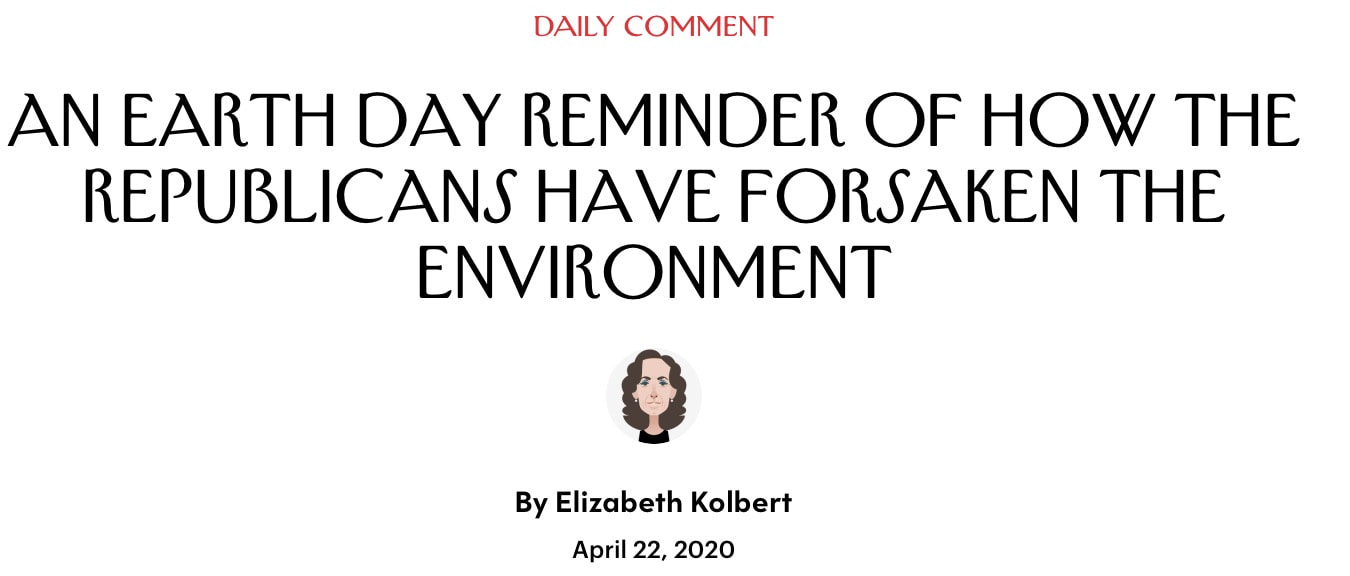
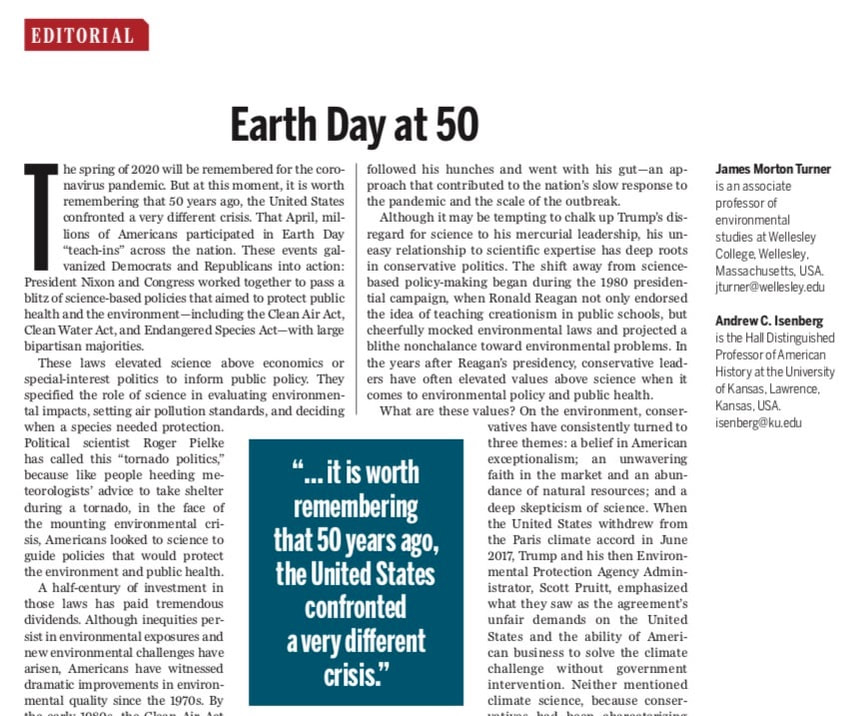
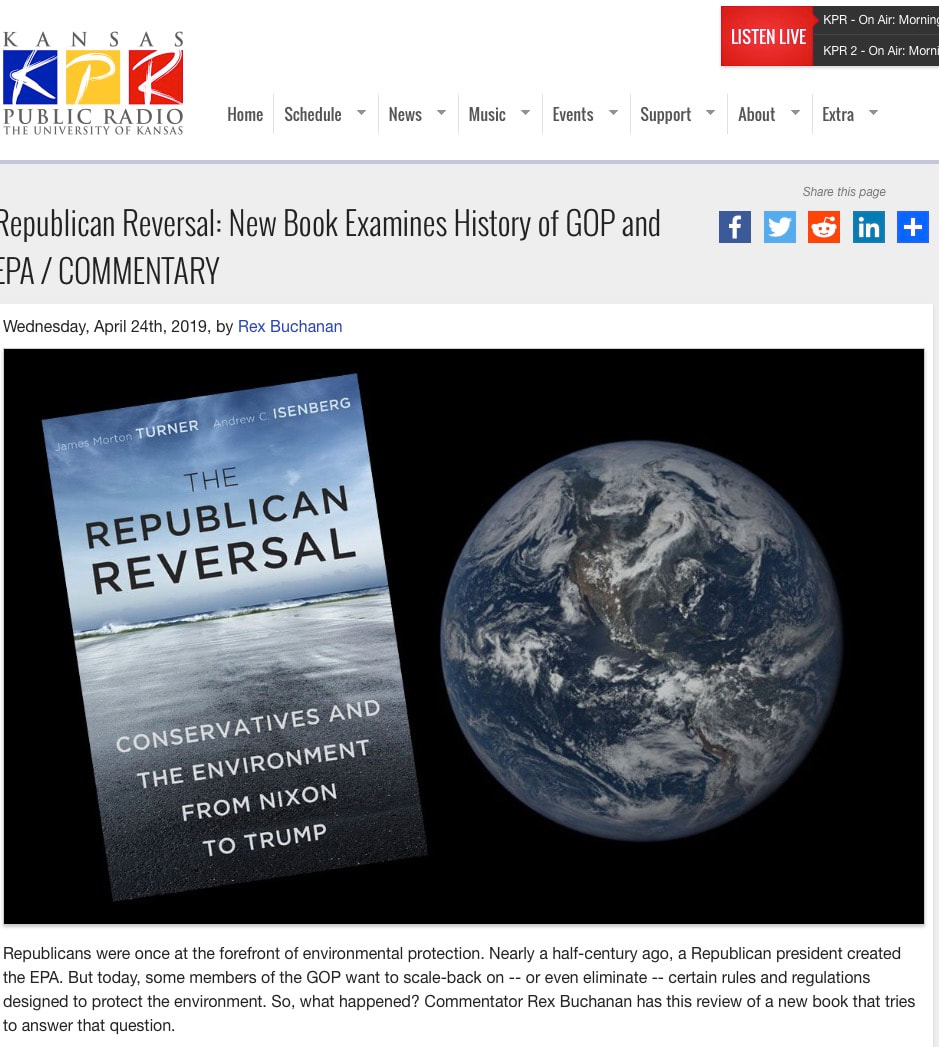
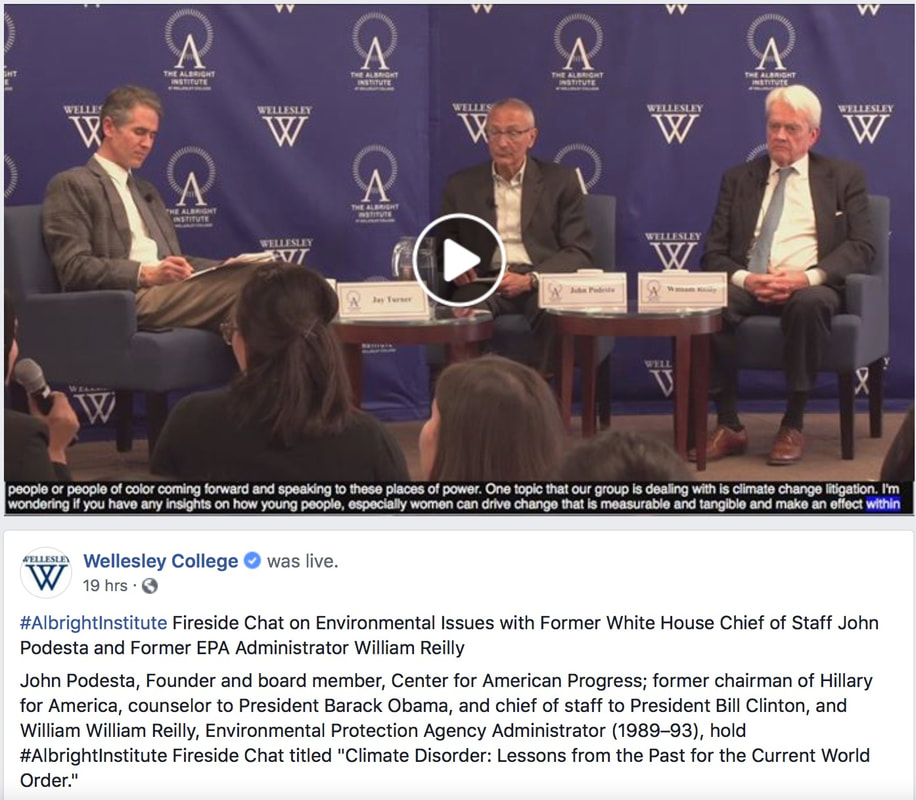

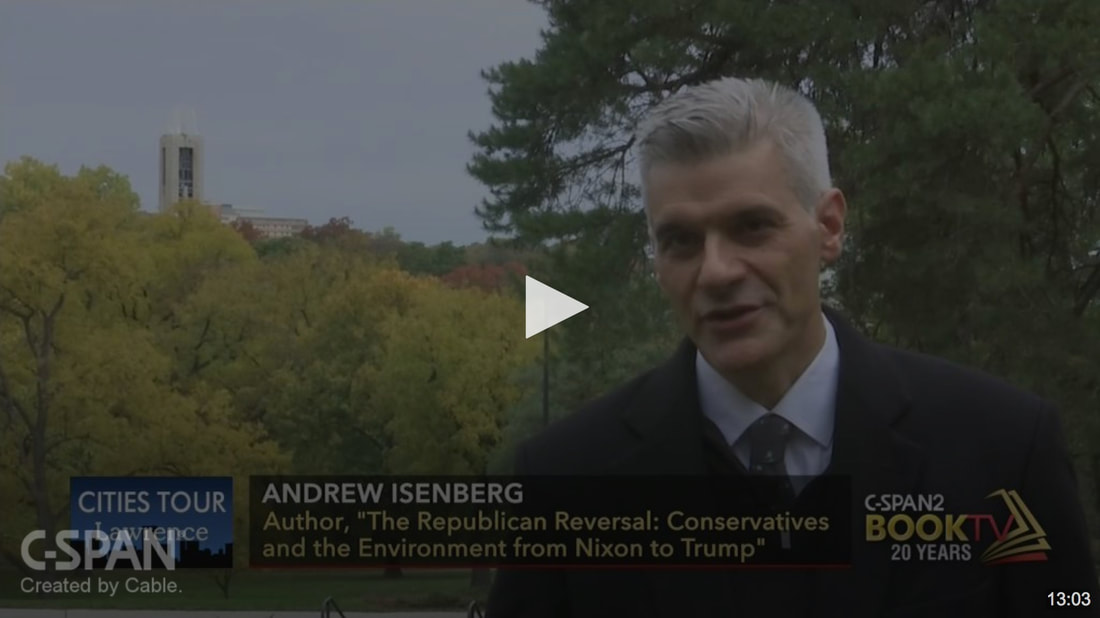
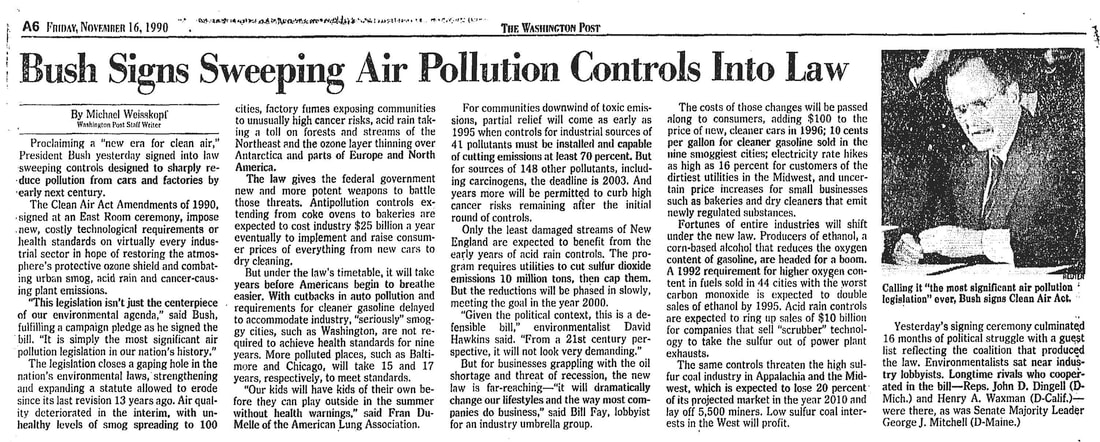
 RSS Feed
RSS Feed